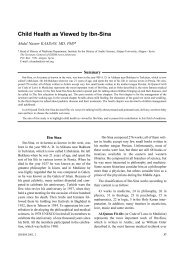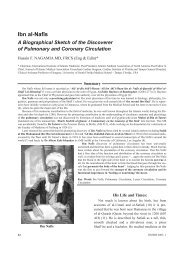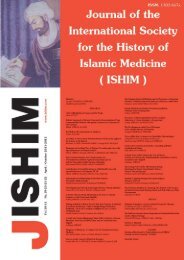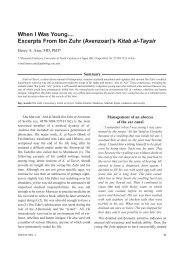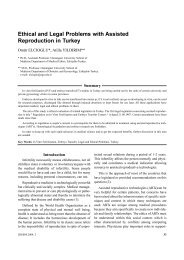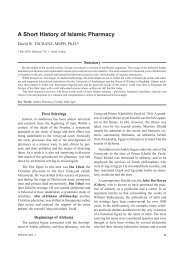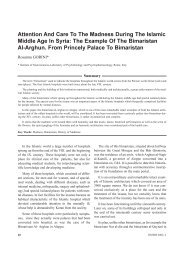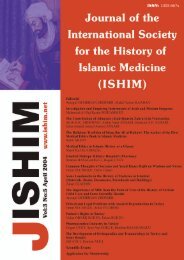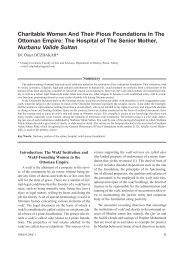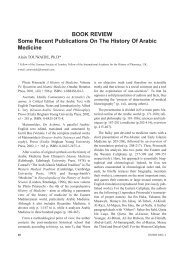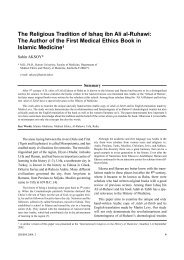Islamic Medicine History and Current Practice - International Society ...
Islamic Medicine History and Current Practice - International Society ...
Islamic Medicine History and Current Practice - International Society ...
- No tags were found...
Create successful ePaper yourself
Turn your PDF publications into a flip-book with our unique Google optimized e-Paper software.
TRUTH-TELLING INFORMATION AND COMMUNICATIONWITH CANCER PATIENTS IN TURKEYthe patient <strong>and</strong> that the social security system that thepatient is bound to does not offer many choices fortreatment. For this reason it is underst<strong>and</strong>able that thesituation is that most physicians are not skilled incooperating with patients, in establishing or maintaininga collaborative relationship with patients <strong>and</strong> thatpatient also do not have any expectations. When arequest for a relationship like this does not come frompatients it is important for the physician to initiate it.However before everything the physician mustbelieve that this kind of relationship is beneficial <strong>and</strong>that there is value in helping the patients be effectiveparticipants (6, 7).Data from a Research StudyRelated to this SubjectData from a limited research study done at AnkaraUniversity Medical Faculty Ibn Sýna (Avicenna)Hospital related to the approach of physician c<strong>and</strong>idates<strong>and</strong> physicians on the subject of informingpatients about their diagnosis of cancer will shedlight of the situation in our country. Although thisstudy was only done at one hospital, because it is areferral center <strong>and</strong> teaching hospital it would not bewrong to say that it reflects the attitudes of physiciansin our country. This study was done with a questionnairegiven to 58 physicians <strong>and</strong> 150 medical students.In addition interviewing face-to-face 82 newlydiagnosed cancer patients on different services theirlevel of information was determined. At the end ofthe study it was seen that 52% of the physicians <strong>and</strong>medical students have a “protector, guardian”approach to the cancer patients. Also it can be acceptedthat the medical students having a paternalisticapproach is an indicator that this attitude will not bechanging in the near future in our country. In theface-to-face interviews with the patients the factsshow that the patients had been informed at a levelfar below that of Western st<strong>and</strong>ards, 52 of the 82patients did not have information about their disease(63.4%). It was seen that the patients who had a highchance of recovery had been informed at a higher ratethan the others. The level of informing patients alsoincreased with an increase in the patient’s socioeconomiclevel <strong>and</strong> educational level (8).When looking at the research results on the subjectof truth-telling <strong>and</strong> general practice what are theNuket ORNEK BUKENreasons for the differences in the situation in ourcountry from that in Western countries? Althoughthere are signed international agreements at variouslevels in our country it can be said that the necessarylegal foundation <strong>and</strong> control does not exist currentlyon this subject. On the other h<strong>and</strong> it seems that it willbe difficult to change the “protector, guardian physicianattitude” that our cultural <strong>and</strong> social foundationbrings <strong>and</strong> that is supported by the <strong>Islamic</strong> religion’s“fatalistic world view.” In fact there is a large numberof physicians who insist that it is not right to say“worrying” things to people with terminal illnesses.In addition during medical education physicians arenot given sufficient information about “giving thepatient bad news” <strong>and</strong> “informing the patient.”Legal Regulations in OurCountry about Truth-TellingWhen looking at legal documents related to truthtelling in Turkey, we see that the decision is a sovereignunderst<strong>and</strong>ing that is left entirely to the physician.However from the point of view of principles ofmedical ethics we see the principle of beneficence<strong>and</strong> doing no harm are given weight in evaluation.When we look at these legal regulations’ relatedarticles that support the physician’s paternalistic attitude,we can say that it is important that the 14 thArticle in the Turkish Medical DeontologyRegulation is related to truth telling. According tothis article it is necessary that the patient be clearlytold their diagnosis <strong>and</strong> the necessary precautionsthat should be taken related to their diagnosis, howeverthe disease’s bad prognosis should be hiddenfrom the patient. If the patient desires the possibilityof the patient’s ab<strong>and</strong>onment should be considered<strong>and</strong> the diagnosis can be told to the family.In the Patients’ Bill of Rights, dated 1998, the 19 thArticle that is related to truth-telling, the decisionabout whether to tell the patient the truth is left entirelyup to the physician. It states that “When there is apossibility of worsening the patient’s illness with a badeffect on the patient’s spiritual make-up <strong>and</strong> when thecourse <strong>and</strong> result of the illness is serious it is advisablethat the diagnosis be kept hidden from the patient.” Inaddition when the patient does not request it this kindof diagnosis is told to the patient’s family.JISHIM 2003, 235



